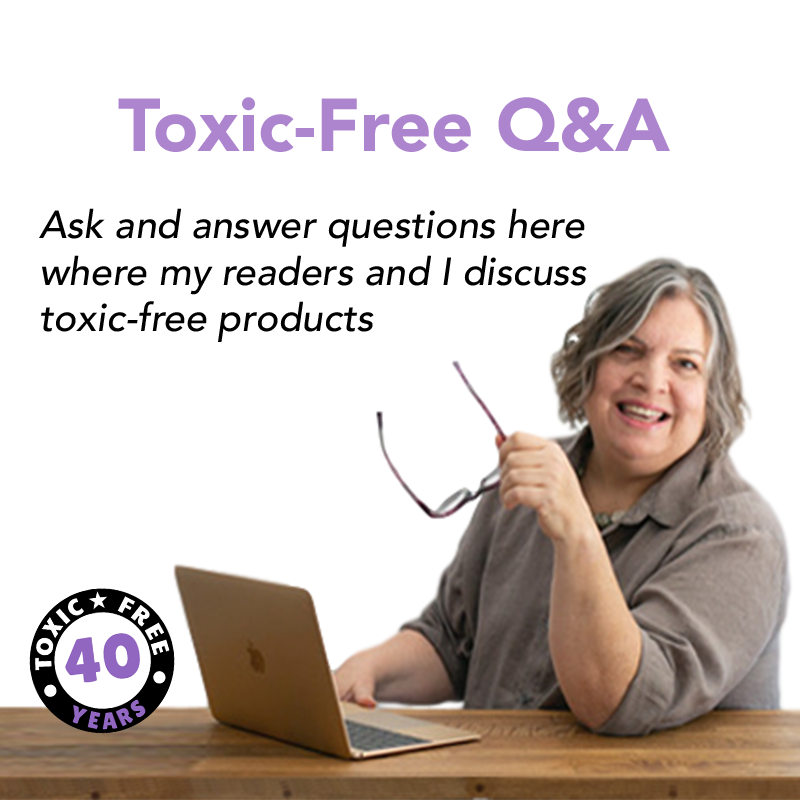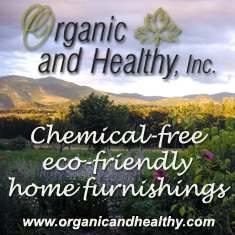
Submitted questions will be posted with my response by the following Tuesday or before.
Submitted comments will be moderated and approved within 24 hours.
Dish detergents
Question from Laura
After 8 months of breathing problems from the dish soap my mother uses she switched to Ecover. Even though I’m not at the house much anymore she is still using it. But it dries her hands. I think if a product removes dirt from dishes it’s going to remove natural oil from skin.
Do you have any suggestions other than using gloves? Also Ecover doesn’t get rid of tea stains. Does any detergent, or does one just need to use baking soda? I don’t mind the extra steps, but some people aren’t ready for that yet.
Debra’s Answer
Personally, at the moment I’m using Dr. Bronner Magic Soap (peppermint) to wash my dishes,
Readers, your recommendations?
Prefinished wood floor installation
Question from J. S.
Dear Debra,
You’ve written a number of times that you have installed prefinished wood floors without any problems. I’m about to have a prefinished wood floor installed over an existing wood sub-floor. The contractor told me a layer of paper is placed between the two, and gave me different options, such as, builder’s paper, rosin paper, construction paper, and black felt. For the chemically sensitive person, is there a preference? What did you use for your floors?
Thank you for your help.
Debra’s Answer
I have never used anything between the subfloor and the wood floor except yellow glue. I don’t think it’s necessary.
Of the list you give, the plainest paper without anything added to it would be the best.
Teflon-free Breadmaker
Question from Janet Wolf Strand
Debra,
Do you know where I can purchase a teflon-free breadmaker? I have several parrots and I cannot cook with teflon because it could be fatal to my birds.
I have searched but cannot find one. Please help.
Debra’s Answer
I don’t know. When I bake bread, which is rarely, I use an old loaf pan.
Readers?
How to Reduce, Reuse, and Recycle Plastic Grocery Bags
If you don’t live in San Francisco, where plastic grocery bags have been banned, you may still be facing that choice of paper or plastic at the checkout.
Personally, I bring my own canvas bag, or opt for paper. The inherently biodegradable paper bags get reused as garbage bags.
If you do have some plastic bags lying around or have a steady stream of them coming in, here’s a great resource for info about plastic bags, suggestions on how to reduce and reuse them, and where to recycle them (if your local store doesn’t already collect them back).
21st Century Citizen: 25 Resources to reduce, recycle and reuse plastic grocery bags
Speaking of bags, here’s a tip for upcoming holiday gift wrap. Yesterday I was talking with a reporter for a story about “Green Christmas” and we were talking about giving reusable bags as holiday gifts. She remarked that many of the big stores are now selling their own reusable bags with their logo on them. She had already purchased her husband’s Christmas gift at Home Depot and will be wrapping it in their reusable bag with the Home Depot logo. A great idea for reusable gift wrap.
Shelf Life And Homemade Sweeteners
Question from kitti
Hey thanks for putting up this excellent site – its just about the only one I’ve been able to find so far on homemade sweeteners. I’ve got low blood sugar, so i’m looking for an inexpensive sugar-alternative, to help me regulate that.
I’d like to learn to make Rice syrup, without the glucose (barley), but I’m not sure if its a good process for a home cook? Apparently the Japanese used to use Koji enzymes (which i think they also use in sake) which is some kind of mold(?) that breaks down the sugars. Unfortunately I havn’t found alot of good information on this subject as of yet. I like the idea of Rice syrup because its a complex sugar which breaks down more effectively than white sugar.
Your apple syrup recipe looks awesome – easy and inexpensive! But what is its shelf life? Should you keep it in the fridge or is it safe to store in a pantry? And (assuming one buys an apple concentrate without added sugar) how much better is this stuff than white sugar/fructose corn syrups?
I suppose you could make the same stuff with any other concentrated fruit juice?
If you know of any other good recipes or references I can look into, please post it.
Keep up the great work!!
Debra’s Answer
I think that making rice syrup is probably a long and laborious process–not that one shouldn’t do long and laborous processes, but it probably requires some “art” as well.
Apple syrup is easy to make. I don’t know the shelf life. I would keep it in the fridge. I’ve kept some in the fridge for weeks (like over a month) and it was fine. I would probably make an amount you would use in a month, not gallons.
You could make fruit syrup with any fruit juice. You could even start with fresh fruit juice instead of concentrate, it would just take longer to cook down.
Apple syrup is the only natural syrup I know of that a home cook could make. I suppose if you had access to maple sap you could boil that down, or you could evaporate cane juice if you had a sugar cane press and access to fresh sugar cane.
Toothpaste and Nature’s Gate
Question from Joan Christensen
Hi Debra,
Could you recommend to me some choices for natural toothpaste?
I found some with Nature’s Gate called Nature’s Gate Organics Peppermint Whitening Toothpast with Flouride 5 oz. for $6.99. Also comes in Raspberry flavor. Do you recommend Nature’s Gate products?
I did not see this company in you list.
Thank you.
Debra’s Answer
If you haven’t already, I suggest you read the post on this blog Q&A: Tooth Soap, which talks a lot about toothpaste and other methods of cleaning teeth as well.
Just because a company is not listed on Debra’s List doesn’t mean it’s not a good company. I have many websites waiting to be added, as I only have so many hours in the day… 🙂
That said, I just took a look at the Nature’s Gate website and right away there was a “red flag”–the statement “blending nature and science to benefit you and the Earth”. This generally means that the products are not 100% natural. That “sciene” part usually indicates the presence of man-made artificial ingredients.
Now I want to say some things here about these products, but I don’t want it to sound like I am picking on Nature’s Gate. These points apply to many so-called “natural” products.
You asked about toothpaste. I looked at the ingredients for Creme de Peppermint Natural Toothpaste, which is fluoride-free and contains baking soda. Both good. Also some natural flavorings, some herbal extracts, and sodium lauryl sulfate. Now sodium lauryl sulfate is one of those not-quite-natural ingredients that comes from a natural source, but is processed with chemicals. So it’s not, per se, 100% natural, but is considered natural by the natural product industry because it’s source is a plant ingredient. It’s about like adding pesticides to a plant, which is still considered natural to the natural products industry. Sodium laurel sulfate (SLS) is no longer considered safe and is being removed from many natural product formulations now. So, no, I wouldn’t put this toothpaste on Debra’s List. The best ingredient in this toothpaste is baking soda, so why not just brush your teeth with baking soda?
I also took a look at their new “organics” line. Now, if you look at the organic bodycare products on Debra’s List, you’ll find that most of the ingredients are organically grown. Nature’s Gate “Organics” Lavender & Aloe Nourishing Conditioner for All Hair Types has only one organic ingredient…the lavender. The rest are those not-quite-natural “science” ingredients.
Sensatia
Question from Joan
Hi Debra,
I have another question about a maker. There is a maker called Sensatia (www.sensatia.com) from Bali, Indonesia. Could you tell me if you would recommend products from that company?
Thanks.
Debra’s Answer
Looks good to me. I like that they list all their ingredients and even show pictures of the soap being made. These are definately “all natural” products.
The only thing for me, though, is that while they say they use organic ingredients, on the ingredients lists they don’t specify which are organic. It’s also not clear if they are 100% organic. It also doesn’t say they are certified organic. So these are my reservations.
I want to be clear that, personally, I am looking for the most organic products possible, so I’m pretty picky. But there is a whole spectrum of products that are better than the worst, most toxic, unhealthy products, and it’s better to use any one of those “better” products than the worst products.
These seem to be “much better” than most. They may even be exquisite. But all I have to go on is how they present themselves in their own website description.
Hand Sanitizer
Question from DAVE
My wife and I keep hand sanitizer in the car which we use time to time to clean our kids’ hands.
My six year then told me yesterday that she is asked to use hand sanitizer, what she calls “magic soap”, everyday at school to clean up after recess. Her friend uses it to clean her desk!
My question is whether this level of exposure over time poses any risk to my kids from the chemicals in hand sanitzer?
Debra’s Answer
There is a whole discussion on this blog about hand sanitizer at Q&A: Earth-Friendly Hand Sanitizer. I wouldn’t suggest having children use regular hand sanitizer on a daily basis as it contains alcohol from a petrochemical source to kill germs.
I just found a 100% natural hand santizer the other day in my local natural food store that does not contain alcohol and is safe for children. It’s called Clean Well Hand Sanitizer. The active germ-killing agent is Ingenium(tm), a patented blend of organically-grown essential oils, including thyme. It meets the EPA and FDA standards for germ-killing efficacy.
If it is required for your child to use a hand santizer, perhaps you could suggest a safer, natural hand sanitizer, such as Clean Well or one of the ones mentioned in the earlier post.
PCBE: how old do I have to go?
Question from AS
I want to buy a couch/sofa for my living room. I want used but need to know how old do I have to go before I am pre-PCBE use? I imagine they starting being used mid-century. Are there any other toxins/materials I should be concerned about and can avoid by going back to a certain time.
Debra’s Answer
I don’t know when they were introduced.
Readers?
Padding Under Hardwood Floors
Question from Mary
Good Morning,
We are having prefinished hardwood floating floor installed.
The representative suggested they put a ‘muffler’ layer of padding under the flooring to muffle the sound & give a slight cushion.
We have just had to remove all carpet due to a mold problem so I am hesitant to put any fabric in/on the floor. ( we live in Ga. so humidity is high here.)
Do you have an opinion on this ?
thanks!
Debra’s Answer
I’ve installed at least a half a dozen prefinished wood floors and have never installed a “muffler.” I’ve installed these floors over concrete and wood subfloors.
This seems to be a new thing–perhaps to sell more materials?
I’ve never noticed a problem with sound nor needed cushioning.
I would especially not install a foam padding due to outgassing, and your case a natural material would only grow mold, so that’s out too.







